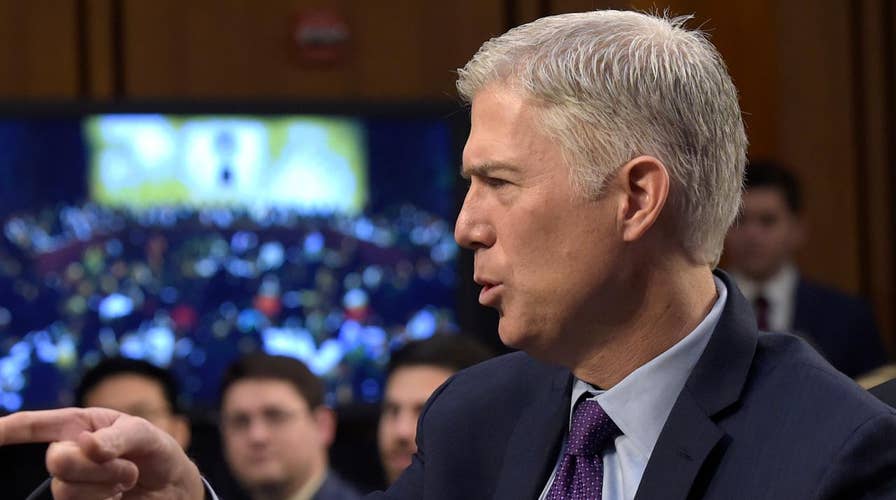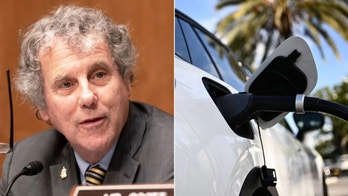Democrats tee up tough questions for SCOTUS nominee Gorsuch
Peter Doocy reports from Capitol Hill
The Supreme Court confirmation hearing for Neil Gorsuch is likely to take a sharp turn Tuesday after a relatively smooth opening day on Capitol Hill where the nominee was able to speak about his view on topics like the importance of an independent judiciary.
Senate Democrats on Tuesday get to raise concerns about President Trump's pick to replace the conservative icon Antonin Scalia. Democrats will likely try to make Gorsuch appear beholden to big business and out-of-touch with the poor. Sen. Patrick J. Leahy, D-Vt., said outright that Gorsuch was “selected by interest groups.”
With day 1 of Judge #Gorsuch’s hearing complete, @SenateDems set stage for tough ?s they will ask tomorrow – American ppl deserve answers.
— Chuck Schumer (@SenSchumer) March 20, 2017
Gorsuch has been preparing for the questioning. He has been holding closely guarded mock hearings that were attended by legal experts.
He wants to avoid the easy soundbite that could throw a wrench in his nomination process.
Sen. Dick Durbin, D-Ill., on Monday, repeated a comment by White House chief of staff Reince Priebus said last month that Gorsuch "represents the type of judge that has the vision of Donald Trump."
"I want to hear from you why Mr. Priebus would say that," Durbin said to Gorsuch. "Most Americans question whether we need a Supreme Court justice with the vision of Donald Trump."
No one could have chosen better than Neil Gorsuch to represent conservatism on the Supreme Court - @LindseyGrahamSC #confirmgorsuch pic.twitter.com/8sEfZrIS0S
— Kevin Bishop (@KevinDBishop) March 20, 2017
Gorsuch, a highly-credentialed judge and conservative member of the Denver-based 10th U.S. Circuit Court of Appeals, is roundly described by critics and friends as a combination of smarts, down-to-earth modesty, disarming warmth and careful deliberation.
But even so, some critics don't think he belongs on the court. They believe he is too quick to side with conservative and business interests at the expense of working Americans and the poor.
Sen. Dianne Feinstein, the Senate Judiciary Committee’s top Democrat, said Monday that the panel’s top priority is to find out if Gorsuch is a “reasonable, mainstream” conservative or not.
Sen. Schumer, D-N.Y., said last week that Gorsuch may “act like a neutral, calm judge” but in reality he “harbors a right-wing, pro corporate, special-interest agenda.”
Besides Gorsuch's take on the court’s role and his view on whether the Constitution is a living body meant to evolve with the times, Democrats are well aware that blocking Gorsuch’s nomination would be a tremendous blow to President Trump.
Trump is still recovering from his national security adviser Michael Flynn’s resignation and while Gorsuch addressed the panel Monday, FBI Director James Comey testified nearby that the bureau is investigating Russian meddling in the election and possible links between Trump associates and the Russians.
The Russian storyline as well as Trump's verbal attacks on federal judges both during the campaign and as president have fed into Democratic efforts to force Gorsuch to break publicly with the man who nominated him.
Gorsuch already has told some senators in private meetings that he found the criticism of the judges disheartening. But Sen. Richard Blumenthal, D-Conn., said the nominee needs to make a statement "publicly and explicitly and directly."
Democrats are not the only ones who work to thwart an opposing party's president's pick for the High Court.
Back in 2009, when Justice Sonia Sotomayor was going through her confirmation hearings, Republicans seized on a comment she made in 2001 that she “would hope that a wise Latina woman with the richness of her experiences would more often than not reach a better conclusion than a white male who hasn’t lived that life.”
Republicans hold 52 out of 100 seats in the Senate. Gorsuch needs 60 total votes. Of those 48 Democrats, 10 of them represent states in which Trump carried in November. His confirmation appears likely, but not guaranteed. Republicans can, however, “go nuclear” and change the rule to confirmation by a simple majority. Sen. Harry Reid, D-Nev., took the unusual step in 2013 to break the filibuster.
Besides Russia, there are two Gorsuch decisions that will likely be a focal point. He once ruled in favor of school that declined to extend the length of a six-month leave of absence to a teacher with cancer. In another case, he ruled against the parents of an autistic son who sought reimbursement of the cost of a private program after they took the boy out of public school. The rulings were unanimous — Gorsuch was joined by liberal judges — and The Wall Street Journal editorial page called the rulings “correct” based on “statue and precedent.” Opinion editors at The Journal report that 89 percent of Gorsuch’s 171 employment cases were unanimous decisions.
Gorsuch pledged on Monday that he would be independent or “hang up the robe.”'
"These days we sometimes hear judges cynically described as politicians in robes, seeking to enforce their own politics rather than striving to apply the law impartially. If I thought that were true, I'd hang up the robe. But I just don't think that's what a life in the law is about," Gorsuch said.
The Associated Press contributed to this report





